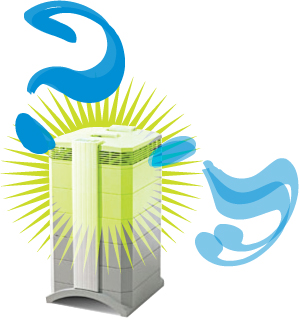 Whether you’re an allergy or asthma sufferer, or someone who is concerned with providing your family with the best indoor air quality, finding a solution to the airborne contaminants in your home is a very important issue. The Environmental Protection Agency (EPA) determined that most indoor air is three to five times dirtier than outdoor air. This startling revelation led to a boom in the production of air purifiers, but do they really work?
Whether you’re an allergy or asthma sufferer, or someone who is concerned with providing your family with the best indoor air quality, finding a solution to the airborne contaminants in your home is a very important issue. The Environmental Protection Agency (EPA) determined that most indoor air is three to five times dirtier than outdoor air. This startling revelation led to a boom in the production of air purifiers, but do they really work?
Most air purifiers remove airborne pollutants like mold spores, pollen, dust, bacteria, and pet dander. But determining whether an air purifier is effective is measured by its ability to capture particles and the amount of air it can process in a given time. Translation: If an air purifier can’t catch particles of all sizes and process enough air to make a difference, it’s probably not worth the cost of shipping. But are air purifiers effective for removing allergens?
The effectiveness of an air purifier is generally based on the effectiveness of its air filter. The American Society of Heating, Refrigeration and Air-conditioning Engineers (ASHRAE) tests and certifies air filters, using a rating system to ensure accuracy. The first rating, Initial Staining Dirt Efficiency, measures how well the filter removes microscopic staining particles such as tobacco tar, allergens, and grease. The second rating, the Average Arrestance Test, determines the percentage of ordinary dust, hair, lint, and other large particulate matter removed. It’s important to know which rating is being used when comparing air purifiers.
Air contaminants like dust and pollen particles are measured by the micron. The human eye cannot see particles that are smaller than 10 microns, as one micron equals 1/25,400 of an inch. Particles like lint, dust, and pollen can all be seen by the human eye, but smaller contaminants like bacteria and viruses will escape the detection of our eyes and some filters. Finding a filter that will eliminate air impurities of all sizes is important to ensure the effectiveness of air purifiers.
HEPA (High Efficiency Particulate Air) filters set the standard for effective air cleaning. HEPA filters have been tested and certified to remove particles that average 0.3 micron in size. Particles of this size are likely to be inhaled and deposited into the lungs and trigger allergic and asthmatic reactions.
To qualify as a true HEPA filter, the filter must remove at least 99.97% of airborne contaminants, including mold spores, dust, pollen, smoke, and pet dander. There are many generic HEPA filters on the market today; however, true HEPA filters are marked as such on their packaging and provide the most efficient filtration.
Most air purifiers on the market are tested and certified by the Home Appliance Manufacturers (AHAM), using the Clean Air Delivery Rate, or CADR. The CADR measures how many cubic feet per minute of air is cleared of certain size particles. Three particle sizes are rated: smoke (small), dust (medium), and pollen (large).
Rating air purifiers is simple: the higher the CADR rating, the less time the unit needs to remove a given quantity of certain particles from the specified size room. The room size is indicated on the packaging of the air purifier and all AHAM-certified models are marked with CADR data, as this information acts to distinguish each air purifier from its competitor. You can use the CADR ratings to determine which air purifier works best in your home.
As you can see, there are many standards and ratings requirements used for all air purifiers. These requirements are used to ensure that every consumer receives the benefits they’ve been guaranteed by the manufacturer. Air purifiers can’t guarantee the elimination of allergies or asthma. However, HEPA air purifiers can guarantee the elimination of harmful airborne contaminants.
So if you’re struggling with the decision of whether to buy an air purifier or which air purifier to buy, consider the large variety of HEPA air purifiers on the market. Find an air purifier that works for you and your family, and breathe easier knowing that you’re breathing clean air.
